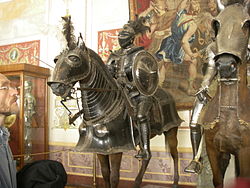This article needs additional citations for verification .(August 2011) |
It has been suggested that this article be merged into Black Knight . ( Discuss ) Proposed since July 2025. |

The black knight is a literary stock character who masks his identity and that of his liege by not displaying heraldry. Black knights are usually portrayed as villainous figures who use this anonymity for misdeeds. They are often contrasted with the knight-errant (white knight). The character appeared in Arthurian literature and has been adapted and adopted by various authors, in cinema and popular culture. The character is sometimes associated with death or darkness.